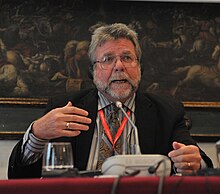
The Pulitzer Prize for Investigative Reporting has been awarded since 1953, under one name or another, for a distinguished example of investigative reporting by an individual or team, presented as a single article or series in a U.S. news publication. It is administered by the Columbia University Graduate School of Journalism in New York City.

The Pulitzer Prize for Public Service is one of the fourteen American Pulitzer Prizes annually awarded for journalism. It recognizes a distinguished example of meritorious public service by a newspaper or news site through the use of its journalistic resources, which may include editorials, cartoons, photographs, graphics, video and other online material, and may be presented in print or online or both.

The Pulitzer Prizes for 1980 were announced on April 14, 1980. A total of 1,550 entries were submitted for prizes in 19 categories of journalism and the arts. Winners were chosen by the 16-member Pulitzer Prize Board, presided over by Clayton Kirkpatrick. For the first time in the Prizes' history, finalists were announced in addition to the winners.
Gene Miller (1928–2005) was a longtime investigative reporter at the Miami Herald who won two Pulitzer Prizes for reporting that helped save innocent men on Florida's Death Row from execution. He was also a legendary editor, mentoring generations of young reporters in how to write crisp, direct, and entertaining stories. When he died of cancer in 2005, the Herald called him "the soul and the conscience of our newsroom."
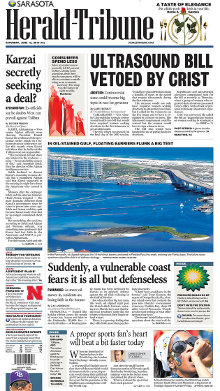
The Sarasota Herald-Tribune is a daily newspaper, located in Sarasota, Florida, founded in 1925 as the Sarasota Herald.
The 1993 Pulitzer Prizes were:
Michael D. Sallah is an American investigative reporter and non-fiction author who has twice been awarded the Pulitzer Prize.
Oscar Jose Corral is a Cuban-American journalist and filmmaker. In 2012, Corral directed and produced a documentary film, Tom Wolfe Gets Back to Blood, which enjoyed a national run on PBS and was screened in more than 40 independent theaters around the country. It is the only film ever made about Tom Wolfe, an iconic author and satirist whose stature in American letters has loomed large for the last half century. The film is about how Wolfe researched his Miami-set novel, Back to Blood, in South Florida.
Scott Higham is a Pulitzer Prize-winning member of The Washington Post's investigations unit. He graduated from Stony Brook University, with a B.A. in history and has a M.S. from the Columbia Graduate School of Journalism. Higham also earned an A.S. in criminal justice at Suffolk County Community College.
Herbert A. Jacobs was a journalist for the Milwaukee Journal and later a professor of journalism at the University of California, Berkeley.
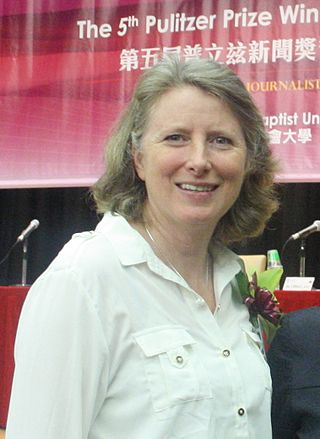
Paige St. John is an American journalist with the Los Angeles Times. Before joining the Times, St. John was at the Sarasota Herald-Tribune, where she earned the 2011 Pulitzer Prize for Investigative Reporting. The Pulitzer was the Herald Tribune's first, "for her examination of weaknesses in the murky property-insurance system vital to Florida homeowners, providing handy data to assess insurer reliability and stirring regulatory action."
Lizette Alvarez is an American journalist, and has worked for more than two decades with The New York Times. She has served as the Miami bureau chief since January 2011. Alvarez has been a reporter for the New York Daily News, and TheMiami Herald.
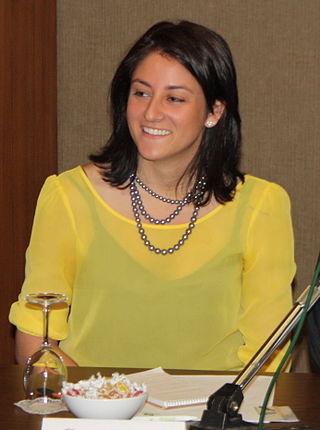
Sara Elizabeth Ganim is an American journalist, now a correspondent for CNN. Previously she was a reporter for The Patriot-News, a daily newspaper in Harrisburg, Pennsylvania. There she broke the story that featured the Sandusky scandal and the Second Mile charity. For the Sandusky/Penn State coverage, "Sara Ganim and members of The Patriot-News Staff" won a number of national awards including the 2012 Pulitzer Prize for Local Reporting, making Ganim the third-youngest winner of a Pulitzer. The award cited "courageously revealing and adeptly covering the explosive Sandusky sex scandal involving former football coach Jerry Sandusky."
The National Center on Disability and Journalism (NCDJ) provides resources and support to journalists and communications professionals covering disability issues. The center is headquartered at the Walter Cronkite School of Journalism and Mass Communication at Arizona State University.
Carol Marbin Miller is a senior investigative reporter at The Miami Herald. Marbin Miller began covering social welfare programs at the St. Petersburg Times in the 1990s. She joined The Miami Herald in 2000 and has reported extensively on Florida's services to children as well as the state's juvenile justice system, programs for people with disabilities, mental health and elder care.
Patrick Farrell is a Pulitzer Prize-winning American photojournalist for the Miami Herald.
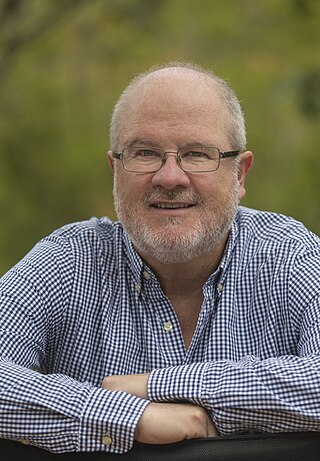
Gerardo Reyes Copello is an investigative journalist. He works as director of the investigative unit of Univision Network. He worked at El Nuevo Herald in Miami, Florida. In The Miami Herald, he won a shared Pulitzer prize in 1999.
Julie K. Brown is an American investigative journalist with the Miami Herald best known for pursuing the sex trafficking story surrounding Jeffrey Epstein, who in 2008 was allowed to plead guilty to two state-level prostitution offenses. She is the recipient of several awards including two George Polk Awards for Justice Reporting.
John Lantigua is an American journalist and crime novelist. His journalism awards include the Pulitzer Prize, 1999, for work on voter fraud while at The Miami Herald; the Robert F. Kennedy Journalism Award, 2004 and 2006, and the National Hispanic Journalists Award for Investigative Reporting, 2004 and 2006, for work on immigration issues while writing for The Palm Beach Post. Lantigua is also the author of seven novels, including the a crime series starring Willie Cuesta, a Cuban American private investigator based in Miami.
